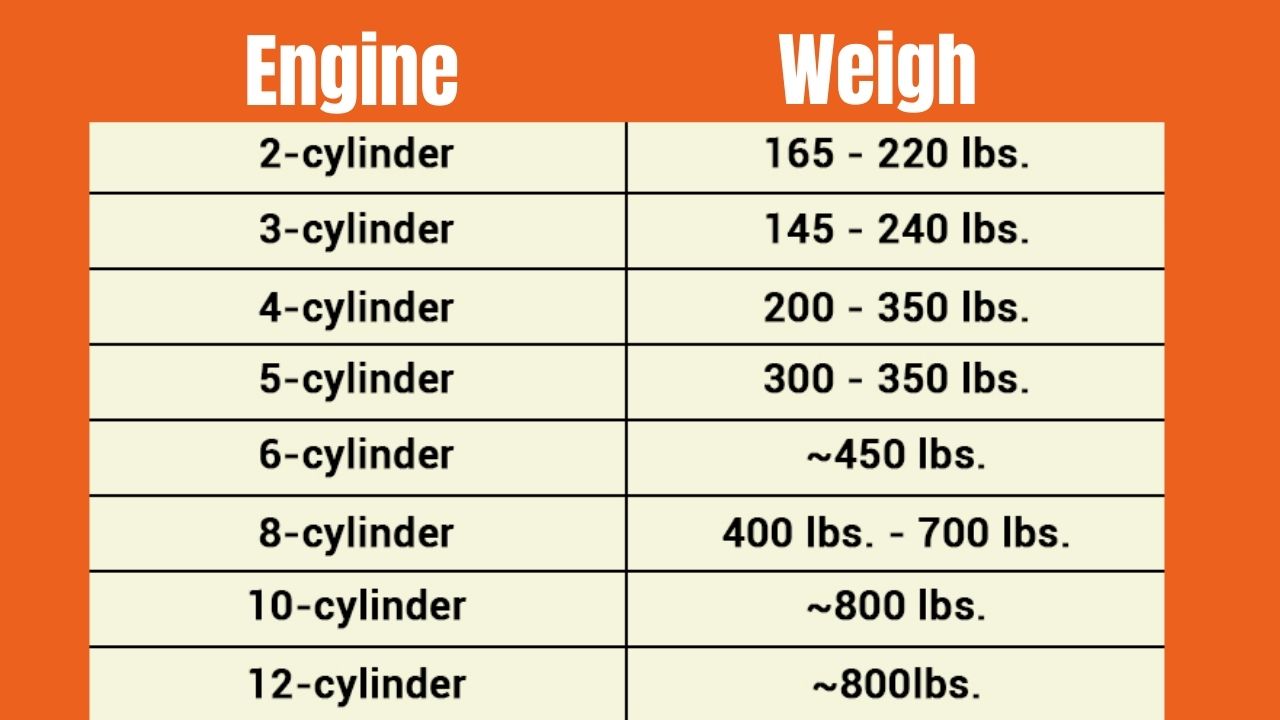Over the years, automotive technology has undergone steady change. The engine is always the component of a freshly released car that garners the most interest and attention.
For those interested in automobiles, there were endless discussions and debates over the new engine’s torque rating, horsepower, speed, and other parameters. Its weight doesn’t seem to be important though.
In case you want to swap out the motor in your car, or if you are just interested, you might be asking yourself how much an automotive engine weighs. Because of the numerous different types of engines available, it is hard to claim all engines have the same weight.
You will learn in this article how much a car engine weighs.
What are the factors affecting how much a car engine weighs?
The weight of a car engine is affected by its:
Size:
The motor’s weight is most impacted by its size. An automobile engine’s class has been determined by the number of cylinders it has. Most passenger cars have a four-cylinder engine in their hood.
Giant cars will have six or eight cylinder engines, many of which are grouped in a V-shape layout. And with each additional cylinder, the weight wil increase.
Model Year:
An engine’s model year also affects its weight. The chances for a modification with the passing of years certainly increases. In some cases, these changes can result in a lighter product.
But due to new technology, additional equipment means extra weight and in some cases, it might also increase.
Material:
Compared to an aluminum-made motor, a cast iron engine will be heavier, which makes construction material another factor that affects weight.
An older engine would likely made of cast iron and thus weigh more than a more recent model that’s made of aluminum. This is why many car models lose weight as they age.
Displacement:
In this case displacement will also dictate the weight. For example, the GM 215 cubic inch engine, because of the lesser displacement, weighs approximately 175 pounds less than the LS1 346 cubic inch engine.
If the holes for the cylinders are larger and the pistons have to move further, you can expect an heavier engine. This is reasoning that argues a large four cylinder engine may be heavier than a small six cylinder engine.
How much does a car engine weigh?
The most weighing V8 engines and the rest of its class are around 400 and 700 lbs, while a V6 is usually more like 300 – 450 lbs.
According to a survey done of one hundred and fifty available automobile engines, out of which diesel engines surfaced as a clear winner, the average weight was 300 to 700 lbs (140 to 320 kg). The diesel engines were noted to exceed 700 pounds.

The weight of an engine can vary greatly depending on the type and size of the vehicle. The following is a general estimation for different types of engines:
Compact Cars
Compact cars typically have smaller engines ranging from 1.0 to 2.0 liters, with an average weight of around 300-400 pounds.
Sedans
Sedans have bigger engines than compact cars, usually between 1.5 and 3.0 liters, and weigh around 400-600 pounds.
SUVs and Trucks
SUVs and trucks have more powerful engines for heavy-duty work. Their engine size typically is between 2.5 and 6.0 liters and weigh about 500-800 pounds.
Sports Cars
Sports cars have powerful engines that typically range from 3.0 to 8.0 liters in size, with an average weight of 600-900 pounds.
Electric Vehicles
As previously stated, electric motors tend to be lighter than internal combustion engines (ICE). The weight of an electric motor varies from 100-300 pounds, depending on its size and power output.
Electric Vehicles: 100-300 pounds (45-136 kg)
Average Engine Weights by Type of Vehicle
Car engines differ in weight depending on the vehicle type. Below is a list of average engine weights for different vehicles:
- Sedans: 300-600 pounds (136-272 kg)
- SUVs: 500-800 pounds (227-363 kg)
- Trucks: 600-1000 pounds (272-454 kg)
- Sports Cars: 600-900 pounds (272-408 kg)
- Electric Vehicles: 100-300 pounds (45-136 kg)
These figures represent estimates and may differ due to factors that include engine size and other parts.
Will the engine weight affect its performance?
The weight of an engine does not seem to have an absolute vehicle performance impact. The performance measurement that serves this purpose best is the pesocity ratio.
That said, to some degree, lighter engines do improve performance. In general, lighter vehicles are more efficient in terms of fuel consumption and also have better handling.
Thus, it is no wonder that engine builders are now using lightweight materials. For example, Jaguar tends to use aluminum more, whereas BMW is much more interested in the production of carbon fiber.